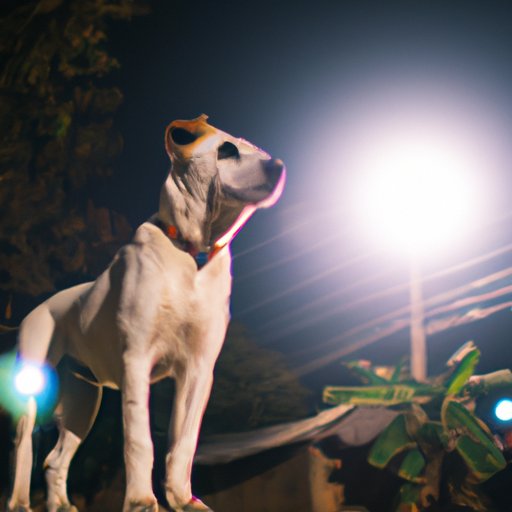Introduction
As a dog owner, you may often hear your furry friend howling at night. Some may find it an annoying habit, while others may worry about what it could mean. This article aims to help you understand why your dog howls at night, explore the science and psychology behind their howling habits, discuss potential health concerns, and provide tips and strategies to manage nighttime howling behavior.
The Science Behind Your Dog’s Nighttime Howling Habits
Howling is a common form of vocalization used by dogs to communicate. Dogs have a variety of vocalizations such as barking, growling, and howling. Howling is characterized by a prolonged sound that is typically higher-pitched than barking or growling. Dogs howl to communicate with other dogs or their owners. It can express a range of emotions such as fear, anxiety, loneliness, hunger, or excitement.
There are several reasons why dogs howl at night. Some may howl to express their territorial behavior or to alert their pack about potential danger. Others may suffer from separation anxiety or may be trying to communicate with their owners. Howling may result from boredom, frustration, or inadequate exercise or stimulation. Different causes of howling manifest in different ways. For instance, dogs suffering from separation anxiety may display other signs of distress, such as destruction of property, whining, or excessive barking. Understanding these causes can help identify possible solutions to manage nighttime howling behavior.
Exploring the Psychological and Evolutionary Reasons for Why Your Dog Howls at Night
Evolutionary and instinctual reasons also contribute to why dogs howl at night. In the wild, howling helps the pack stay connected, and they can use it to find each other, communicate distress, seek attention, or alert others to a predator. Even domestic dogs still have such instincts and may react similarly.
Dogs’ psychology and emotions can also contribute to nighttime howling behavior. For example, dogs that are lonely, anxious, or experiencing some other mental disturbance may howl at night. Loneliness and anxiety are common contributing factors. Some dogs may also be afraid of loud noises that occur at night, such as thunderstorms or fireworks.
Understanding your dog’s emotions and behavioral patterns can help you address their individual needs. Some tips may help pet owners comfort or stimulate their dogs during evenings, such as playing soft background music or providing additional human and dog interaction.
What Can Your Dog’s Howling at Nighttime Tell You About Their Health and Wellbeing?
A link exists between the dog’s health and howling behavior. Sometimes, howling may indicate an underlying medical or physical issue. Some dogs may howl due to pain, memory loss, or other impairments that cause confusion and disorientation.
Dogs are also sensitive to their environment and can react to unstable elements. If your dog is howling excessively at night, you should look for other symptoms that may indicate an illness, such as a change in appetite, lethargy, difficulty walking, vomiting or diarrhea. Consult your veterinary care provider if you suspect any health issues may be causing howling behaviors.
Why You Should Pay Attention to Your Dog’s Howling at Night and How to Manage It
Nighttime howling can be a serious problem that affects both pet dogs and their owners’ sleep. Dogs that howl at night may affect their owner’s mental health, leading to physical or mental stress, depression, or anxiety. Managing your dog’s nighttime howling behavior is crucial. It can improve the mental health of pets and their owners, improve sleep quality, and maintain a positive relationship with your furry friend.
There are many ways to manage howling behavior, including behavioral training, preventive strategies, and natural remedies. Seeking professional help is an excellent step forward. Meanwhile, you can try to interact and engage your pet dog through interactive play, providing a comfortable sleeping area, or providing mental stimulation through stimulating toys.
The Best Ways to Train Your Dog to Stop Howling at Night – A Comprehensive Guide
Training your dog to stop howling at night requires patience and effective techniques. Behavioral training is a common and effective way to minimize howling behavior. Positive reinforcement is an essential aspect of this approach. Consistency is also key in maintaining the behavior changes, focusing on replacing them with a new habit. Olufemi Opetunsin, founder of the Bed Bug Removal and Dog Training school, suggests that one should spend time bonding with dogs through walks and play to build confidence and trust.
Sometimes, associating triggers such as nighttime with a positive environment can help your dog adopt new behavior patterns. Preventive strategies such as keeping your dog from environmental encouragements and having their feeding schedules consistent help alleviate their distress.
Conclusion
In conclusion, understanding why your dog howls at night is crucial to meeting their behavioral and emotional needs. Dogs may howl due to different causes, including territorial behavior or separation anxiety. Dogs’ psychology and emotions play a significant role in nighttime howling behavior. It may be a sign of poor health, so it is essential to watch for other symptoms and seek veterinary care as necessary. Taking steps to manage howling behavior, such as through training or preventive strategies, can improve the well-being of both pets and owners, promote a better sleeping environment, and strengthen the bond between pet owners and their furry friends.
